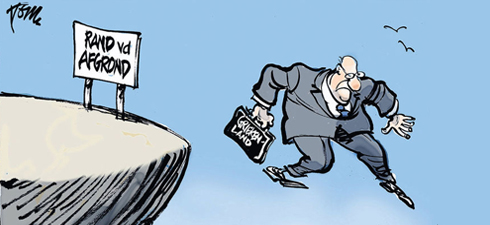Of course,Neelie Kroes was called to order on 7 February by her colleagues in the European Commission. Brussels’ official line has been and continues to be that Greece will have to be kept on board at all costs — and specifically with a further loan for 130 billion euros — because if one stone falls, the entire edifice of the euro will collapse. And at that point, the price to be paid will be far greater than the one for emergency aid to the Greeks.
The fact that the Commissioner for Digital Agenda chose to ignore this financial domino theory in an interview given to De Volkskrant was not an involuntary slip or a blunder. On the contrary, her remarks are the latest manifestation of a drive that began last autumn to dismantle a number of European taboos, so that hearts and minds will be prepared to abandon the Greeks to their fate if that proves to be necessary.
The first of these euro taboos — the denigration of Greek politicians — was put to the test last September by EU diplomats. The pent-up exasperation of spending cuts that Athens promised and then forgot more quickly than it could apply them finally drew scathing criticism.
“We can’t keep bailing”
“We have had enough of Greek bullshit and procrastination,” said one. Another described the management of the crisis as “an out-an-out scandal”; a third went as far as to speculate about the possibility of Greek default: “We can’t keep bailing. There comes a time when the captain has to say: ‘Everyone into the lifeboats, we have to jump ship.’”
The second taboo —a country cannot be excluded from the eurozone – was breached in November by German Chancellor Angela Merkel and French President Nicolas Sarkozy. When the Greek Prime Minister sparked their ire by announcing a referendum on spending cuts, Merkozy made it known that the only relevant question was: would Greece stay in the euro or not? Clearly, it was possible to leave.
In the same month, European presidents Herman Van Rompuy and José Manuel Barroso put an end to a third taboo: the euro will never end. In an emotional presentation to the European parliament, they both warned that the survival of the euro could be jeopardised if EU leaders did not rapidly intervene.
In recent weeks, it has been the turn of taboo number four: a eurozone country can never go bankrupt. Once again, Merkel and Sarkozy, and also Dutch Finance Minister Jan Kees De Jager, declared that Athens could forget about its second 130 billion emergency loan if it did not satisfy criteria stipulated by the EU and the IMF. And without this money, Greece will go bankrupt, added Eurogroup President Jean-Claude Juncker, just in case there were any doubts on the matter.
Commissioner Kroes has taken down the fifth and last taboo
Now Commissioner Kroes has taken down the fifth and last taboo, which had been accepted as dogma: that the eurozone would collapse if Greece went back to the drachma. “It is absolutely untrue,” declared Kroes. In this context, it is worth bearing in mind that Greece’s European Commissioner Maria Damanaki (in charge of fisheries) said this weekend that Brussels had already prepared emergency plans for a Greek exit from the euro — an assertion subsequently denied by the Commission.
These remarks from Merkel, Sarkozy, Kroes and EU diplomats have made it possible to discuss a Greek exit from the eurozone.Dutch Prime Minister Mark Rutte and Dutch Finance Minister Jan Kees De Jager have acknowledged that such an eventuality could take place. But that is not to say it is going to happen this week — the extremely painful negotiations between international backers and the Greek government, which remain ongoing in Athens, will nonetheless probably result in an agreement in coming days.
But all of the parties involved know that in three months they will be back in Athens where they will once again conclude for the umpteenth time that Greece has not kept its promises. And everyone will then be prepared for a Greek exit. And more importantly no one will say that it comes as a surprise.
Greek crisis
Grexit not a tragedy for EU
Political and economic chaos will turn Greece into a failed state, warnsDziennik Gazeta Prawna, analysing a recent Citibank report on the Greek crisis. The report estimates that the risk of Athens’ defaulting on its sovereign debt in the next 18 months stands at 50 percent and there are many indications to believe that “leaving the eurozone will be a tragedy for the Greeks but not the EU.” Why?
Firstly, with each successive restructuring plan, European banks have been writing off more and more Greek debt. So while in the case of default, Greek bonds will become worthless, losses for the EU financial institutions will be limited.
Secondly, the financial markets have clearly distinguished between the case of Greece and Portugal, which are unable to survive without outside help, and that of Ireland, Spain, and Italy. [...] In this situation, Brussels has a much stronger position in negotiating with the Greeks.
However, the talks have stalled, so more and more EU politicians believe that a Greek default and exit from the eurozone could be the least evil.
Was this article useful? If so we are delighted!
It is freely available because we believe that the right to free and independent information is essential for democracy. But this right is not guaranteed forever, and independence comes at a cost. We need your support in order to continue publishing independent, multilingual news for all Europeans.
Discover our subscription offers and their exclusive benefits and become a member of our community now!












